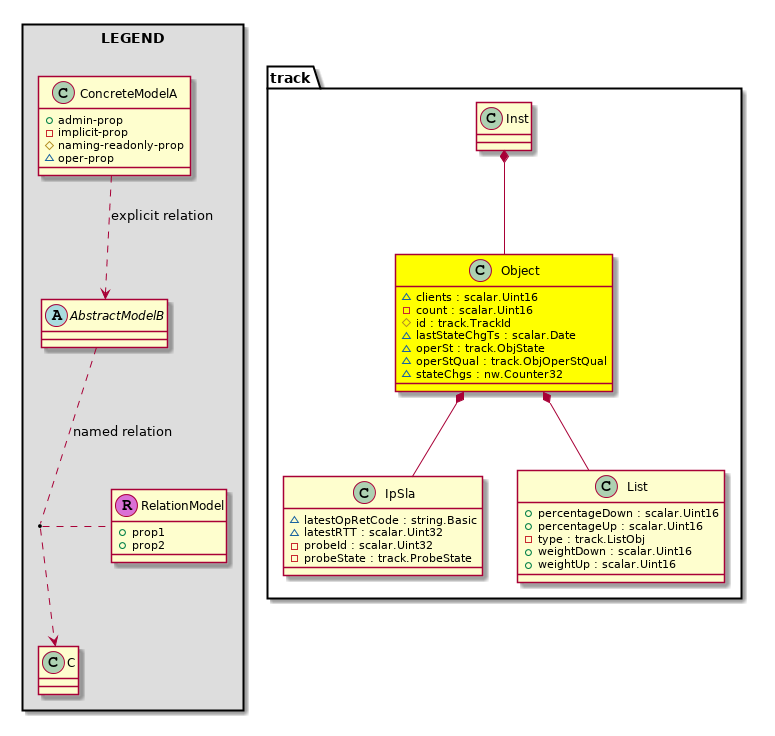| Properties Summary |
| Defined in: mo:Resolvable |
mo:Owner
scalar:Enum8
|
lcOwn (mo:Resolvable:lcOwn)
A value that indicates how this object was created. For internal use only.
|
childAction
Type: mo:ModificationChildAction
Primitive Type: scalar:Bitmask32
Units: null
Encrypted: false
Access: implicit
Category: TopLevelChildAction
Comments:
-
Delete or ignore. For internal use only.
| |
| Constants |
| deleteAll |
16384u |
deleteAll |
NO COMMENTS
|
| ignore |
4096u |
ignore |
NO COMMENTS
|
| deleteNonPresent |
8192u |
deleteNonPresent |
NO COMMENTS
|
| DEFAULT |
0 |
--- |
This type is used to
|
|
clients
Type: scalar:Uint16
Units: null
Encrypted: false
Access: oper
Category: TopLevelRegular
Comments:
-
Number of clients tracking object
count
Type: scalar:Uint16
Units: null
Encrypted: false
Access: implicit
Category: TopLevelRegular
Comments:
-
A block count.
dn
Type: reference:BinRef
Units: null
Encrypted: false
Access: implicit
Category: TopLevelDn
Comments:
-
A tag or metadata is a non-hierarchical keyword or term assigned to the fabric module.
id
Type: track:TrackId
Primitive Type: scalar:Uint32
Units: null
Encrypted: false
Naming Property -- [NAMING RULES]
Access: naming
Category: TopLevelRegular
Comments:
-
An object identifier.
lastStateChgTs
Type: scalar:Date
Units: null
Encrypted: false
Access: oper
Category: TopLevelRegular
Comments:
-
Time of last state transition
lcOwn
Type: mo:Owner
Primitive Type: scalar:Enum8
Units: null
Encrypted: false
Access: implicit
Category: TopLevelRegular
Comments:
-
A value that indicates how this object was created. For internal use only.
| |
| Constants |
| local |
0 |
Local |
NO COMMENTS
|
| policy |
1 |
Policy |
NO COMMENTS
|
| replica |
2 |
Replica |
NO COMMENTS
|
| resolveOnBehalf |
3 |
ResolvedOnBehalf |
NO COMMENTS
|
| implicit |
4 |
Implicit |
NO COMMENTS
|
| DEFAULT |
local(0) |
Local |
NO COMMENTS
|
|
modTs
Type: mo:TStamp
Primitive Type: scalar:Date
Units: null
Encrypted: false
Access: implicit
Category: TopLevelRegular
Comments:
-
The time when this object was last modified.
| |
| Constants |
| never |
0ull |
never |
NO COMMENTS
|
| DEFAULT |
never(0ull) |
never |
NO COMMENTS
|
|
operSt
Type: track:ObjState
Primitive Type: scalar:Enum8
Units: null
Encrypted: false
Access: oper
Category: TopLevelRegular
Comments:
-
The runtime state of the object or policy.
| |
| Constants |
| down |
0 |
Down |
NO COMMENTS
|
| up |
1 |
Up |
NO COMMENTS
|
| undefined |
2 |
Undefined |
NO COMMENTS
|
| DEFAULT |
undefined(2) |
Undefined |
NO COMMENTS
|
|
operStQual
Type: track:ObjOperStQual
Primitive Type: scalar:Enum8
Units: null
Encrypted: false
Access: oper
Category: TopLevelRegular
Comments:
-
The chassis operational status qualifier.
| |
| Constants |
| unspecified |
0 |
Unspecified |
NO COMMENTS
|
| internal-err |
1 |
Internal Error |
NO COMMENTS
|
| invalid-type-change |
2 |
Modification of object type not allowed |
NO COMMENTS
|
| invalid-thrshld-wt-cfg |
3 |
Invalid threshold weight config |
NO COMMENTS
|
| invalid-thrshld-percent-cfg |
4 |
Invalid threshold percentage config |
NO COMMENTS
|
| invalid-member-obj |
5 |
Invalid member object |
NO COMMENTS
|
| DEFAULT |
unspecified(0) |
Unspecified |
NO COMMENTS
|
|
rn
Type: reference:BinRN
Units: null
Encrypted: false
Access: implicit
Category: TopLevelRn
Comments:
-
Identifies an object from its siblings within the context of its parent object. The distinguished name contains a sequence of relative names.
stateChgs
Type: nw:Counter32
Primitive Type: scalar:Uint32
Units: null
Encrypted: false
Access: oper
Category: TopLevelRegular
Comments:
-
No. of state transitions
status
Type: mo:ModificationStatus
Primitive Type: scalar:Bitmask32
Units: null
Encrypted: false
Access: implicit
Category: TopLevelStatus
Comments:
-
The upgrade status. This property is for internal use only.
| |
| Constants |
| created |
2u |
created |
In a setter method: specifies that an object should be created.
An error is returned if the object already exists.
In the return value of a setter method: indicates that an object has been created.
|
| modified |
4u |
modified |
In a setter method: specifies that an object should be modified
In the return value of a setter method: indicates that an object has been modified.
|
| deleted |
8u |
deleted |
In a setter method: specifies that an object should be deleted.
In the return value of a setter method: indicates that an object has been deleted.
|
| DEFAULT |
0 |
--- |
This type controls the life cycle of objects passed in the XML API.
When used in a setter method (such as configConfMo), the ModificationStatus
specifies whether an object should be created, modified, deleted or removed.
In the return value of a setter method, the ModificationStatus indicates the actual
operation that was performed. For example, the ModificationStatus is set to "created"
if the object was created. The ModificationStatus is not set if the object was neither
created, modified, deleted or removed.
When invoking a setter method, the ModificationStatus is optional:
If a setter method such as configConfMo is invoked and the ModificationStatus
is not set, the system automatically determines if the object should be created or modified.
|
|

